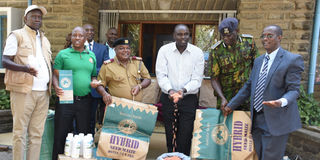Premium
Alarm as counterfeit, substandard seeds on sale in South Rift

Nakuru County Commissioner Lyford Kibaara, Kephis ag director responsible for seed quality Simon Maina and other top county security team brief the media at the Rift Valley DCI headquarters after seizing fake seeds worth more than Sh13 million.
What you need to know:
- Fake and substandard seeds still in circulation in the South Rift as the long rains season begins.
- Suspects linked to counterfeit maize seeds and fertiliser arrested in Nakuru and Kakamega.
Farmers in South Rift are counting huge losses after planting seeds that failed to germinate, leading to crop failure in the last season.
Nation.Africa has established that fake and substandard seeds are still in circulation in the South Rift as the long rains season begins.
In a concerted effort to safeguard farmers from falling victim to fraudulent practices, authorities in Nakuru and Kakamega arrested suspects over the production and distribution of counterfeit maize seeds and fertiliser.
The arrests came as President William Ruto warned manufacturers and distributors of fake agricultural products.
“We are going to make sure that those who sell fake seeds and fertiliser face the music. Just today, we have arrested some of the characters who want to take advantage of our fertiliser supply programme and we already have many more who are facing court,” President Ruto said in Kakamega.
In Nakuru, the operation initiated by public tip-offs involved a collaborative effort between the Directorate of Criminal Investigation, Kenya Plant Health Inspectorate Services (Kephis) and Kenya Seed Company.
The investigative team conducted a raid on a business premise situated within Golf Estate in Njoro Sub County.
The premises were initially registered as a timber yard but are engaged in illicit activities with its proprietor, Stephen Gicharo, arrested.
Also found were counterfeit seeds purported to be Hybrid 6213 packaged with genuine KSC branding, 100 kilos of treated seeds, a sewing machine, and 18 bags of untreated maize seeds.
There was also a weighing apparatus, glue, 34,780 counterfeit packaging stickers, seed dressing chemicals, and a dressing machine.

Nakuru County Commissioner Lyford Kibaara (center) and top county security officers display fake seeds worth more than Sh13 million that were seized.
The intercepted consignment, purportedly Hybrid 6213 variety seeds from Kenya Seed Company, posed a significant threat to unsuspecting farmers preparing for the planting season.
“What made us establish that they were fake seeds are the stickers they had put on the two kilogrammes packets. It looks genuine but when you scratch the stickers it does not pull off. Normally when you input the numbers displayed one will receive information from Kephis indicating the date it was manufactured and the expiry date,” Nakuru County Commissioner Loyfard Kibara said.
Mr Gicharo was arraigned in court on Wednesday, with officers granted additional time for further investigation. Efforts to trace the destination of the counterfeit seeds and potential accomplices are underway.
KEPHIS acting director Simon Maina reiterated the organisation's commitment to upholding seed quality standards.
He urged farmers to remain vigilant, emphasising the difficulty in discerning genuine seeds from counterfeits. Mr Maina assured farmers of ongoing monitoring efforts and encouraged them to seek assistance from Kephis offices.
“We are into the planting season. We have seen crooks come up, but the government is very keen on the quality of seed the farmers receive. We are on high alert as Kephis. The seeds are common in counties we call the grain basket of Kenya, so it would have done a lot of damage. Farmers have invested in their lands, purchased fertilisers and then planted fake seeds," said Mr Maina.
A tour of the affected farms revealed withering yellow maize plants.
A farmer in Nakuru, Kennedy Warui, decried a double loss after the previous season's maize was ravaged by the lethal necrosis disease.
He had expected to harvest 30 bags of maize after spending close to Sh40,000.
“The seeds were from an agro distributor within Nakuru town and planted on some 14 acres. But the maize withered,” Warui said.
Jeremiah Mutai, a farmer in Narok, said the stunted maize was not good for silage-making as it was infested by disease and pests.
“It’s a total loss,” he said.
Recently, Paul Kiprono Ronoh, the Principal Secretary for Crops Development, said following investigations by the agency, it had become clear that farmers had been exploited for a long time, leading to crop failure and the spread of pests and diseases.
"A recent crackdown by Kephis has led them to dealers in Uganda, Rwanda and Congo and shows how they have exploited farmers in the region," Dr Ronoh said.
“Kephis has been undertaking quality assurance on seeds sold in the country through post-certification surveillance during the onset of the planting – both in short and long seasons in the country,” Dr Rono said.
Prof Theophilus Mutui, the Kephis Managing Director, said the crackdown against those selling uncertified seeds was bearing fruit and farmers were expected to see a rise in the production of cereals, which would boost food security in the country.
“We will continue surveillance in all 47 counties to create awareness to the public on quality seeds. Farmers should be vigilant while purchasing seeds, check for the Kephis smart label to check the authenticity of the seeds and not fall prey to those selling uncertified seeds,” Prof Mutui said.
The sale of fake seeds has negatively impacted the government's efforts to raise crop production under the fertiliser subsidy programme that kicked in one and a half years ago.
In January, four traders were arrested for selling fake maize seeds to unsuspecting farmers in Kericho County.
Maize production has sharply dropped in the South Rift region, especially in Bomet, Kericho and Narok counties, due to the MLND outbreak. The disease reportedly started in Bomet County.
“Some of the unscrupulous traders are using red oxide to colour the seeds to hoodwink farmers that they are certified ones yet they are fake. Some of the seeds are not only inferior but are infested by diseases, thus infecting other crops when planted,” Mr Maina said.
All certified seeds in the country have a scratch panel with a unique Kephis code that can be scanned and verified.
Some cereals that have been affected by the sale of fake seeds in the region are beans and peas, according to Kephis.





